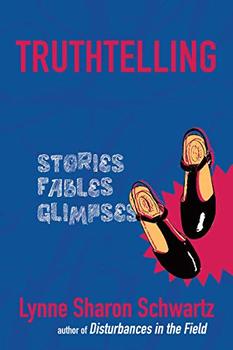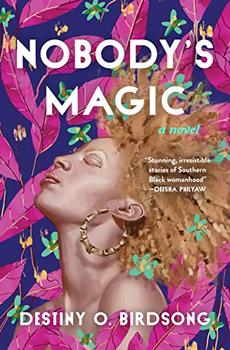Summary | Excerpt | Reviews | Beyond the book | Read-Alikes | Genres & Themes | Author Bio

Stories, Fables, Glimpses
by Lynne SchwartzThe word "unsayable" can mean something is too vast to be put into words. Alternatively, it can refer to the things we can't say because they'd be hurtful or they'd make us look bad. In Lynne Sharon Schwartz's short story collection Truthtelling, the author communicates the unsayable — both definitions — in a wide range of situations. Through their discomfort, Schwartz's characters become uncannily relatable, even if they're not always likable. The writer deftly distills this complexity into stories told in a matter-of-fact style that's never showy or self-indulgent. This book will appeal to readers across numerous demographics.
There are 25 stories, and they differ substantially in length. Some are paragraph-long microfictions and others feature full plot arcs. This range was helpful because it was easy to find time to read a story and digest it before returning to read another. They do share common characteristics; for instance, Schwartz's protagonists are frequently educated women in New York City. We don't often know much about their histories and many of them don't have names. Instead, we only see them in the awkward or even tragic moments of the plotlines, like the woman who receives a wrong number break-up call from a stranger. I often found myself wondering what it would be like to meet her characters in real life. For instance, if I met the woman who gives away her babies — the first for having an annoying voice and the second for being deaf and therefore unmusical — would I neglect to notice her pettiness, knowing nothing about her, and find her charming?
I was stunned at how true Schwartz's characters rang when they dealt with situations akin to my own. The protagonist of "A Few Days Off" — known only as "a certain woman" — wakes up feeling burned out and gives herself over to rest as she never has before. As someone with fibromyalgia, I immediately identified with the need to isolate and rest. The unnamed narrator of "Am I a Thief?" was also sympathetic because, like me, she has chronic foot pain. This pain is so unbearable that it incites her to steal a stranger's shoes at a movie theater because they're actually comfortable. Later she realizes she could have just asked the woman where she bought them, and she sees how desperate her condition has made her. During times of my own excruciating pain, I can't say I'd have thought any more clearly. I also wanted to cheer after reading Schwartz's flawless account of being a woman on the subway in "Public Transit." This story opens with a man asking the protagonist to move her backpack so he can sit next to her even though there are empty seats available. They argue and other passengers start taking sides, leaving the woman feeling vulnerable for the rest of the story.
But Schwartz's characters are as likely to hurt others as they are to be hurt. In "A Memory Lapse," a woman simply forgets her mother's existence for a while. In "An Impromptu Visit," a mother stranded by a car breakdown steals a tiny Buddha from the woman who helps her. In "Career Choice," a character named Samantha plans to marry an older man specifically so she can inherit his money. One that resonated in particular for me was "Golden Rule," in which the protagonist Amanda gets begrudgingly drawn into looking after her elderly neighbor, Maria. When Amanda makes soup for Maria and Maria freezes it instead of eating it, Amanda imagines reclaiming her soup after her neighbor dies. Yet, Amanda still attends to her, and we realize her dark thoughts don't cancel out her kindness. Though this story is set in a New York City apartment building, it reminded me of the relationships that formed in my small Virginia hometown.
Wherever and whoever you are, you've probably admonished yourself by wondering if you're a bad person. These stories are here to remind us that everybody has these moments and no one is at their best in bad times. In Truthtelling, Schwartz offers compelling stories of unflinching candor, ultimately helping readers feel less alone with their shortcomings.
![]() This review was originally published in The BookBrowse Review in November 2020, and has been updated for the
January 2022 edition.
Click here to go to this issue.
This review was originally published in The BookBrowse Review in November 2020, and has been updated for the
January 2022 edition.
Click here to go to this issue.

If you liked Truthtelling, try these:

by Destiny O. Birdsong
Published 2023
In this glittering triptych novel, Suzette, Maple and Agnes, three Black women with albinism, call Shreveport, Louisiana home. At the bustling crossroads of the American South and Southwest, these three women find themselves at the crossroads of their own lives.

by Haruki Murakami
Published 2022
A mind-bending new collection of short stories from the internationally acclaimed, Haruki Murakami.
Your guide toexceptional books
BookBrowse seeks out and recommends the best in contemporary fiction and nonfiction—books that not only engage and entertain but also deepen our understanding of ourselves and the world around us.